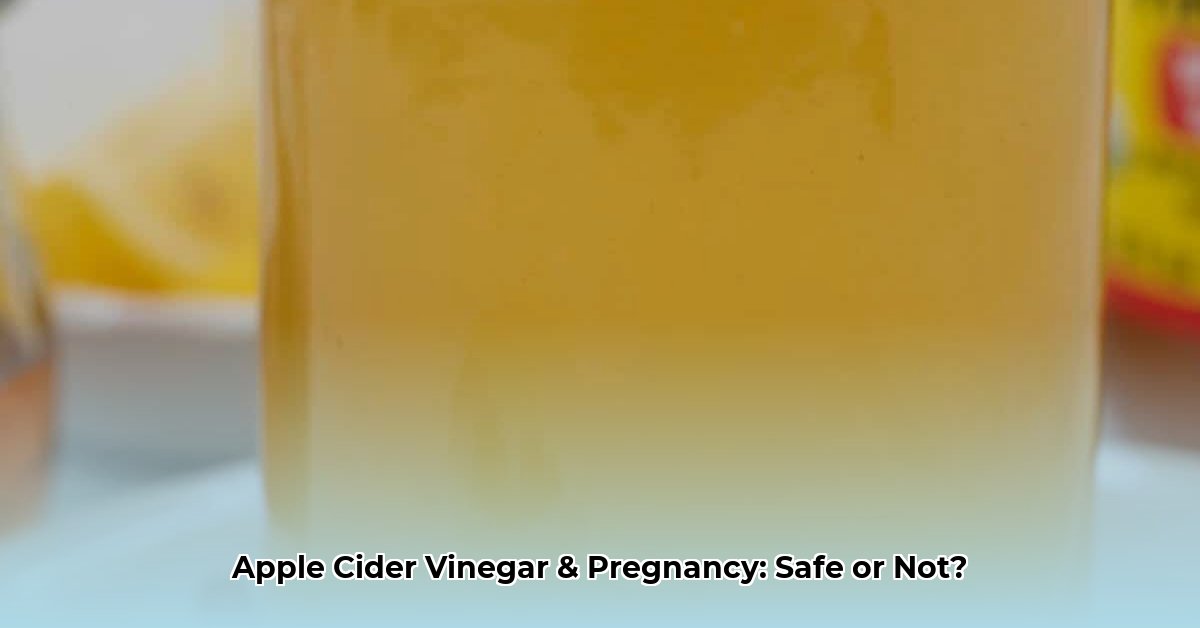While apple cider vinegar (ACV) has gained popularity as a natural remedy for various ailments, its safety during pregnancy isn’t well-established. Always consult your doctor before using ACV or any other unproven remedy while pregnant.
Understanding ACV and Pregnancy
Expecting and curious about ACV? It’s a common kitchen staple, but pregnancy requires extra caution with home remedies. Let’s explore ACV’s potential benefits and risks during this special time.
Pasteurized vs. Unpasteurized ACV
The safety of ACV during pregnancy hinges on pasteurization. Pasteurization is a heat treatment that eliminates harmful bacteria. Pasteurized ACV is generally considered safe for consumption during pregnancy in moderation. Unpasteurized ACV, often labeled “with the mother,” may contain bacteria like Listeria, posing a serious risk to you and your baby. Therefore, unpasteurized ACV is not recommended during pregnancy.
Potential Benefits: Separating Fact from Fiction
ACV has been touted as a remedy for morning sickness, heartburn, and other pregnancy woes. While some pregnant individuals report experiencing these benefits, it’s crucial to note that scientific evidence supporting these claims is limited. Research is ongoing, but conclusive evidence is lacking. Always rely on your doctor’s guidance, not anecdotal evidence, for safe and effective symptom management.
Dosage and Usage: Proceed with Caution
Even if your doctor approves pasteurized ACV, moderation is crucial. A general guideline (if approved by your doctor) is to dilute 1-2 tablespoons of pasteurized ACV in a large glass of water, consumed once or twice daily. For topical use (e.g., diluted for acne), consult your dermatologist first. They can advise on safe skincare practices during pregnancy.
Potential Risks: What to Watch Out For
Even diluted, ACV’s acidity can erode tooth enamel with frequent use. It may also interact with certain medications. Always inform your doctor about everything you’re taking, including supplements and ACV, to avoid potential complications.
Safer Alternatives for Pregnancy Symptoms
Effective, evidence-based remedies exist for common pregnancy symptoms. Ginger can help with nausea, while certain antacids can alleviate heartburn. Your doctor can recommend safe and effective options based on your individual needs.
Delving into ACV Types
Navigating pregnancy often involves a sea of information, including home remedies like ACV. Let’s explore the different types of ACV and why understanding these distinctions is important during pregnancy.
Pasteurization: A Key Safety Factor
Pasteurization is a heat treatment that kills harmful bacteria. This makes pasteurized ACV a safer choice during pregnancy. Unpasteurized ACV, while sometimes perceived as more natural, can harbor bacteria that pose risks to pregnant women.
Benefits and Risks: A Balanced Perspective
Some believe ACV may offer benefits due to its acetic acid content, potentially aiding blood sugar regulation and digestion. However, these claims require further research. Risks primarily relate to bacterial contamination in unpasteurized ACV and potential digestive discomfort from its acidity. Always consult your doctor before using ACV during pregnancy.
Using ACV Safely: Key Precautions
If your doctor approves ACV use during pregnancy, follow these guidelines:
- Choose Pasteurized: Opt for pasteurized ACV to minimize bacterial risks.
- Dilute: Always dilute 1-2 tablespoons of ACV in a full glass of water to reduce acidity.
- Moderate Intake: Consume ACV in moderation, limiting intake to twice a day, preferably with meals.
- Doctor’s Consultation: Always consult your doctor before using ACV during pregnancy.
ACV Benefits During Pregnancy: Myth vs. Reality
ACV is often cited as a potential remedy for various pregnancy symptoms. Let’s examine these claims with a scientific lens.
Pasteurization and Safety
The safety of ACV during pregnancy depends on pasteurization. Pasteurized ACV is generally considered safe in moderation, while unpasteurized ACV should be avoided due to the risk of harmful bacteria.
Potential Benefits: A Look at the Evidence
Claims of ACV alleviating morning sickness, heartburn, and UTIs are largely anecdotal. While some studies suggest possible benefits for blood sugar control, more research is necessary. Consult your doctor for evidence-based advice.
Potential Risks: Moderation Matters
Excessive ACV consumption, even pasteurized, can irritate the throat and digestive system and potentially erode tooth enamel. Moderation and proper dilution are crucial.
Practical Usage Guidelines
If your doctor approves, dilute 1-2 tablespoons of pasteurized ACV in water, consumed once or twice daily. For topical use, dilute further and test a small area first.
ACV Dosage During Pregnancy: What We Know (and Don’t Know)
Currently, no official dosage recommendations exist for ACV during pregnancy. This underscores the importance of consulting your doctor before using it. The lack of research necessitates caution, especially regarding unpasteurized ACV and its potential risks.
Disclaimer: This information is for educational purposes only and does not constitute medical advice. Always consult with a qualified healthcare professional before making any decisions related to your health or treatment.
- How Much Do Wellness Programs Cost Businesses To Offer? - December 16, 2025
- Wellness Fair Ideas for Work to Boost Employee Wellbeing - December 15, 2025
- Affordable Employee Wellness Fair Ideas for Any Budget - December 14, 2025
















